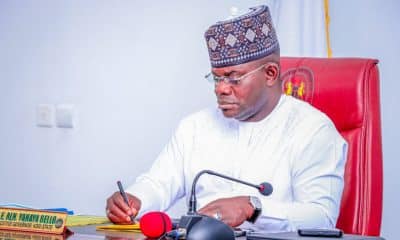Nigeria News
Activism Or Politics: The Gaping Misconceptions In Nigeria Today

In a sane society, accountability, rule-following, political loyalty, yearning for social development, peace-promotion, good governance and the likes would be priority of both the citizens and those elected into various offices as heads.
Unfortunately, while these still remained the desire of many people, it has become almost impossible to achieve, especially in a space like our dear nation, Nigeria.
Greed, selfishness, thirst for power and supremacy have occupied the tablets of the political class in this part of the world. Politics has become a do-or-die matter and good governance is no longer the hunger of many of them who will practically present themselves as angels while seeking positions to occupy.
In the chase to restore some sanity to society, the practice of ACTIVISM came to be. The term itself was traced back to the early 1915-20s.
By definition: Activism is the practice of taking direct action to achieve political or social goals. Activism can involve supporting a particular cause (or range of causes).
It is also making efforts to promote, impede, direct or intervene in social, political, economic or environmental reform with the desire to make changes in society toward a perceived greater good.
Activism In Nigeria
Recently in the quest to hold public office holders and sector heads accountable for their service to humanity having secured various positions in the country, a number of citizens have plunged out to declare themselves as an activist.
Originally, activists are expected to seek good governance, bring government officials close to the masses, promote peaceful co-existence, fight for the right of the oppressed and as well clamour for change of course and pursue true freedom for the masses.
However, unfolding events have shown lately that many individuals parading themselves as activists in the country have a chunk of personal cause they are working to achieve.
Even the most trusted amongst the so-called activists have jumped on the bandwagons, veering off the cause and not minding what will become of their loyal followers, many of which they have bewitched with their sugar-coated mouths.
Practically, anyone who will shun other opportunities and wants to go into activism or politics in Nigeria is assumed to have made his death wish due to how dangerous such practice could be in the country.
The growing number of activists in Nigeria and their participation in some questionable acts lately has, however, raised many questions yet unanswered.
Activism To Politics
It has become almost difficult these days to differentiate between a politician and an activist in Nigeria.
The unvarnished truth, however, is that many activists and even politicians have interwoven acted either way. That is; having a character of a politician today, and an activist the next day.
While the confusion still persists, the truth remains that many activists who make a transition into partisan politics have probably done so for the same reasons they embraced activism.
Recently, the spokesman of the Northern Elders Forum (NEF), Hakeem Baba-Ahmed, interacted with Naija News on the subject matter and established some facts that are worthy to hold on to about politics and activism in Nigeria.
The Gaping Misconception About Politics And Activism
In the little chat with Naija News, Baba-Ahmed was able to note that there is truly some misconception about who an activist is and who a politician is.
Anywhere the word activist is mentioned in Nigerian gatherings, the first thing that comes to the mind of the average is; an influencer or political enforcer.
This perception according to Baba-Ahmed, has damaged the effectiveness of the so-called activists and has as well cut short their relevance in society.
The NEF spokesman said: “Activism is part of the broad political process. It is meaningful only if it has a defined objective of affecting change or social order for an issue or set of issues.
“Activists can get involved with particular political causes or parties, as they do now, largely on the understanding that certain political forces can benefit their causes if they improve their influence over the political process.
“To the degree that their cause and identity are not compromised by that involvement, there is no harm either to them or to causes with which they are identified.
“Integrity is a vital part of social and political activism, and it can be damaged by poor judgements in alliances and partners.
“In Nigeria, activism is still substantially underdeveloped and is easily compromised by political partisanship and shortsighted opportunism.”
The Bottom Line Is
If we must address societal issues in the country, and deal with challenges that have put the African giant in the mud before its counterparts internationally, then the true practice of activism must be revived.
Our political participation as a people must be redefined by closing the gaping misconception between being an activist and exercising our civil rights as citizens.
Though our courts and other institutions that should hold corrupt public office holders accountable might be dysfunctional, we can as a people protest for change by being an activist for good governance.
Until the culture of true activism is actually revived within us, speaking out against injustice will be a nightmare.










